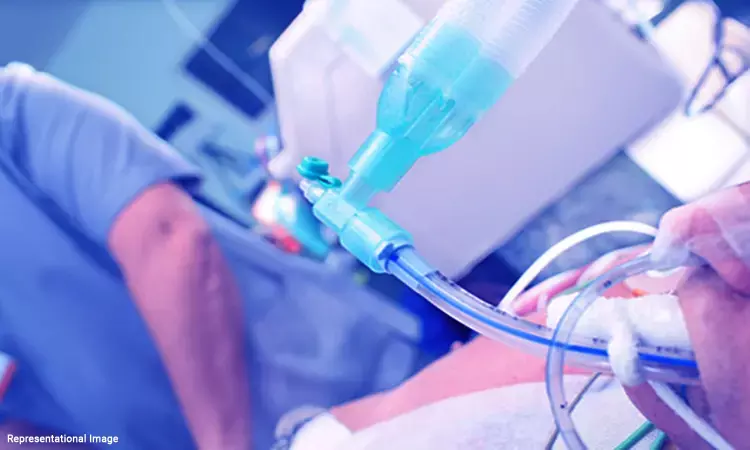- Home
- Medical news & Guidelines
- Anesthesiology
- Cardiology and CTVS
- Critical Care
- Dentistry
- Dermatology
- Diabetes and Endocrinology
- ENT
- Gastroenterology
- Medicine
- Nephrology
- Neurology
- Obstretics-Gynaecology
- Oncology
- Ophthalmology
- Orthopaedics
- Pediatrics-Neonatology
- Psychiatry
- Pulmonology
- Radiology
- Surgery
- Urology
- Laboratory Medicine
- Diet
- Nursing
- Paramedical
- Physiotherapy
- Health news
- Fact Check
- Bone Health Fact Check
- Brain Health Fact Check
- Cancer Related Fact Check
- Child Care Fact Check
- Dental and oral health fact check
- Diabetes and metabolic health fact check
- Diet and Nutrition Fact Check
- Eye and ENT Care Fact Check
- Fitness fact check
- Gut health fact check
- Heart health fact check
- Kidney health fact check
- Medical education fact check
- Men's health fact check
- Respiratory fact check
- Skin and hair care fact check
- Vaccine and Immunization fact check
- Women's health fact check
- AYUSH
- State News
- Andaman and Nicobar Islands
- Andhra Pradesh
- Arunachal Pradesh
- Assam
- Bihar
- Chandigarh
- Chattisgarh
- Dadra and Nagar Haveli
- Daman and Diu
- Delhi
- Goa
- Gujarat
- Haryana
- Himachal Pradesh
- Jammu & Kashmir
- Jharkhand
- Karnataka
- Kerala
- Ladakh
- Lakshadweep
- Madhya Pradesh
- Maharashtra
- Manipur
- Meghalaya
- Mizoram
- Nagaland
- Odisha
- Puducherry
- Punjab
- Rajasthan
- Sikkim
- Tamil Nadu
- Telangana
- Tripura
- Uttar Pradesh
- Uttrakhand
- West Bengal
- Medical Education
- Industry
Prone position improves ventilation in severe COVID-19 patients, finds Wuhan study

Researchers at Wuhan Jinyintan Hospital, China have found in a new study that lying face down was better for the lungs in patients with severe COVID-19 (SARS-CoV-2) hospitalized on ventilators. The study has been published online in the American Thoracic Society's American Journal of Respiratory and Critical Care Medicine.
In "Lung Recruitability in SARS--CoV-2 Associated Acute Respiratory Distress Syndrome: A Single-Center, Observational Study," Haibo Qiu, MD, Chun Pan, MD, and co-authors report on a retrospective study of the treatment of 12 patients in Wuhan Jinyintan Hospital, China, with severe COVID-19 infection-related acute respiratory distress syndrome (ARDS) who were assisted by mechanical ventilation. Drs. Qiu and Pan were in charge of the treatment of these patients, who were transferred from other treatment centers to Jinyintan Hospital.
A majority of patients admitted to the ICU with confirmed COVID-19 developed ARDS.
The observational study took place during a six-day period the week of Feb. 18, 2020.
"This study is the first description of the behavior of the lungs in patients with severe COVID-19 requiring mechanical ventilation and receiving positive pressure," said Dr. Qiu, professor, Department of Critical Care Medicine, Zhangda Hospital, School of Medicine, Southeast University, Nanjing, China. "It indicates that some patients do not respond well to high positive pressure and respond better to prone positioning in bed (facing downward)."
The clinicians in Wuhan used an index, the Recruitment-to-Inflation ratio, that measures the response of lungs to pressure (lung recruitability). Members of the research team, Lu Chen, PhD, and Laurent Brochard, PhD, HDR, from the University of Toronto, developed this index prior to this study.
The researchers assessed the effect of body positioning. Prone positioning was performed for 24-hour periods in which patients had persistently low levels of blood oxygenation. Oxygen flow, lung volume and airway pressure were measured by devices on patients' ventilators. Other measurements were taken, including the aeration of their airway passages and calculations were done to measure recruitability.
Seven patients received at least one session of prone positioning. Three patients received both prone positioning and ECMO (life support, replacing the function of heart and lungs). Three patients died.
Patients who did not receive prone positioning had poor lung recruitability, while alternating supine (face upward) and prone positioning was associated with increased lung recruitability.
"It is only a small number of patients, but our study shows that many patients did not re-open their lungs under high positive pressure and may be exposed to more harm than benefit in trying to increase the pressure," said Chun Pan, MD, also a professor with Zhongda Hospital, School of Medicine, Southeast University. "By contrast, the lung improves when the patient is in the prone position.
Considering this can be done, it is important for the management of patients with severe COVID-19 requiring mechanical ventilation."
The team consisted of scientists and clinicians affiliated with four Chinese and two Canadian hospitals, medical schools and universities.
Dr Kamal Kant Kohli-MBBS, DTCD- a chest specialist with more than 30 years of practice and a flair for writing clinical articles, Dr Kamal Kant Kohli joined Medical Dialogues as a Chief Editor of Medical News. Besides writing articles, as an editor, he proofreads and verifies all the medical content published on Medical Dialogues including those coming from journals, studies,medical conferences,guidelines etc. Email: drkohli@medicaldialogues.in. Contact no. 011-43720751


